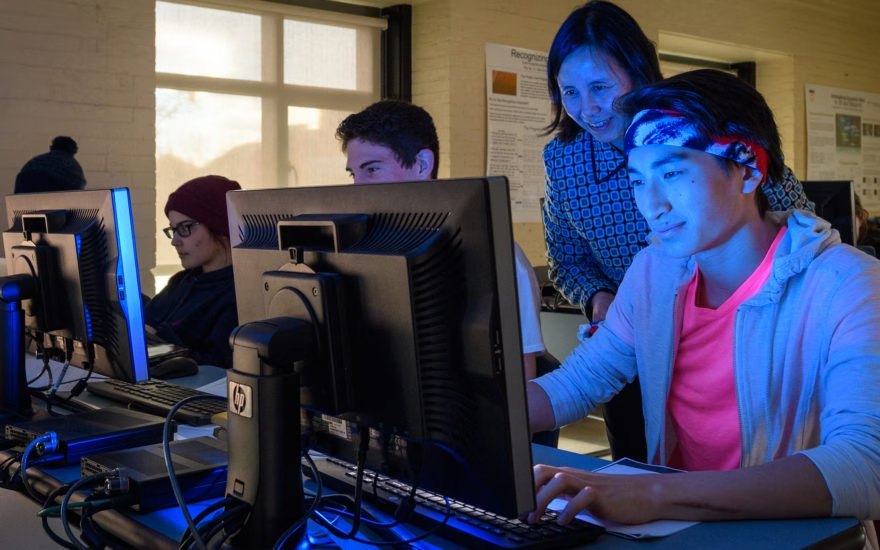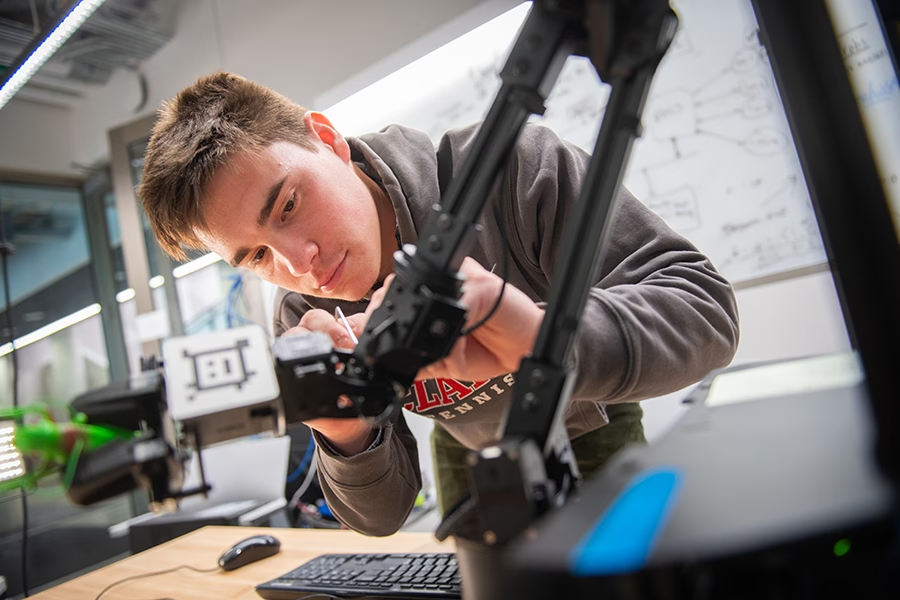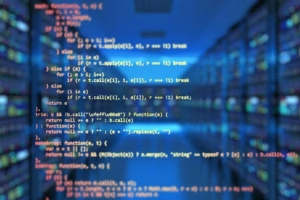Leading to a bachelor of arts degree, Clark’s computer science major is designed to help our students solve complex challenges across a range of fields. You’ll develop a sound foundation in theory and practical applications while learning how computer science can improve humanity.


Why study computer science at Clark?
- Develop a firm grounding in both theory and practical applications, as part of a program that closely follows Association for Computing Machinery/IEEE program guidelines.
- Compete in prestigious computer science competitions and dive into original research as early as your first year.
- Compete in prestigious computer science competitions and dive into original research as early as your first year.
- Follow in the footsteps of graduates who have embarked on a range of exciting careers — our alumni work as software engineers, systems and IT staff, research scientists, and program managers, with some holding positions at Amazon and Google.
4 + 1—An advanced degree within reach
The 4+1 Accelerated Master’s provides an opportunity to earn a pathway to a master’s degree — with one year of additional study and available tuition scholarships. Consider the following option for this major:
- Apply
- Request Info
Are you ready to take the first step?
Sign up to receive information on academics, student life, and the undergraduate admissions process.
Featured Courses

Artificial Intelligence
Using the language Lisp, you’ll learn to craft knowledge representation schemes and tackle sophisticated topics like search techniques, analogy and pattern recognition, and natural language parsing and planning.

Robotics
Get hands-on robotics experience through computer simulation or physical experiments with robot project-component kits while exploring algorithmic issues, related engineering and system topics, and current research.

Diving into Computer Science Research: Modeling Plasmas
From TVs to medicine to microchips, plasmas play a big part in our lives. Learn how by studying and developing mathematical models that explain experimental work and help derive plasmas with specific properties.
As a computer science major, you will learn to solve problems by looking at them from different angles, breaking them down into manageable chunks, and creating efficient solutions. As you learn to think computationally and analytically, you will tackle problems of increasing difficulty — some on your own, and others by working collaboratively in teams. And by studying in a liberal arts setting, you’ll gain a broad perspective on the implications of computer science for human well-being.
At Clark you’ll get more than a great education; you’ll also be prepared for a long, productive career and life of consequence. And once you’ve completed your degree, you can join other Clark alumni who have gone on to work for great organizations and attend some of the best graduate schools in the world. The following communities may be of interest:
Science, Data, and Technology
Because computer science has so many applications, it is naturally interdisciplinary. You might choose to complete a second major, a minor, or a concentration in a related area of interest. Clark’s minor in innovation and entrepreneurship is particularly relevant if you’re interested in starting a business or bringing a product to market. You might also work with a faculty member in another department on a problem of mutual interest.
Software engineers
Amazon, Facebook, Fedex IT, Google, IBM, Microsoft
Systems and IT staff
Google, Wayfair
Financial analyst, actuary
OCC Financial Services, PWS (Pricewaterhousecoopers)
Corporate VIPs, entrepreneurs, independent developers
Research scientists, teachers, lawyers and physicians
Network administrators, database administrators
The Clark Experience
The Clark Experience brings together the exceptional education you’ll receive in the classroom and so much more. Through focus and flexibility, it ensures you’ll leave Clark with the creativity, confidence, and resilience to succeed and lead a life of meaning and consequence.
Frequently Asked Questions
What can I do with a major in computer science?
Our computer science major provides a solid foundation for students who want to apply their knowledge in other fields, as well as for those who want to study computer science in graduate school.
What skills will I learn as a computer science major?
- To analyze problems and design algorithmic solutions
- To write complex, well-organized programs
- To test your results and optimize solutions
- To write reports and instructions for computer users
- To work collaboratively to solve problems
What labs, facilities, and equipment are available?
Mathematics and computer science students and faculty have access to 24 state-of-the-art computers running Linux and Windows; the Computer Science Department and its student systems administrators manage the Linux partition. Computer science students also use the lab to obtain teaching assistant (TA) hours and to participate in group projects.
In addition to the computer science laboratory, many mathematics and computer science majors work in the department’s research laboratory on projects in mathematical and computational biology. The research laboratory contains two iMac computers, one PC running Windows, and an LED screen for projecting images/presentations from these machines or personal laptop computers. The laboratory’s computers are linked by Ethernet to the general-purpose University computers and the University’s high-powered computing cluster. Learn more.
Are computer science majors eligible for academic achievement awards?
Yes, the Outstanding Achievement in Computer Science Award
Is there an honors program for computer science majors?
During your junior year, you might be accepted into the computer science honors program. Joining the program means you’ll work closely with a professor to create a thesis on a topic of your choice. Examples of recent honors thesis topics are:
- Mathematical Modeling of Plasmas
- Darkwood Forest: A Role-Playing Videogame
- Finding a Pattern with the Revenue of Groupon Deals
- Developing an Auto Testing System for Student Programs
Be a force for change.
Come study at a small research university with a strong liberal arts core.

